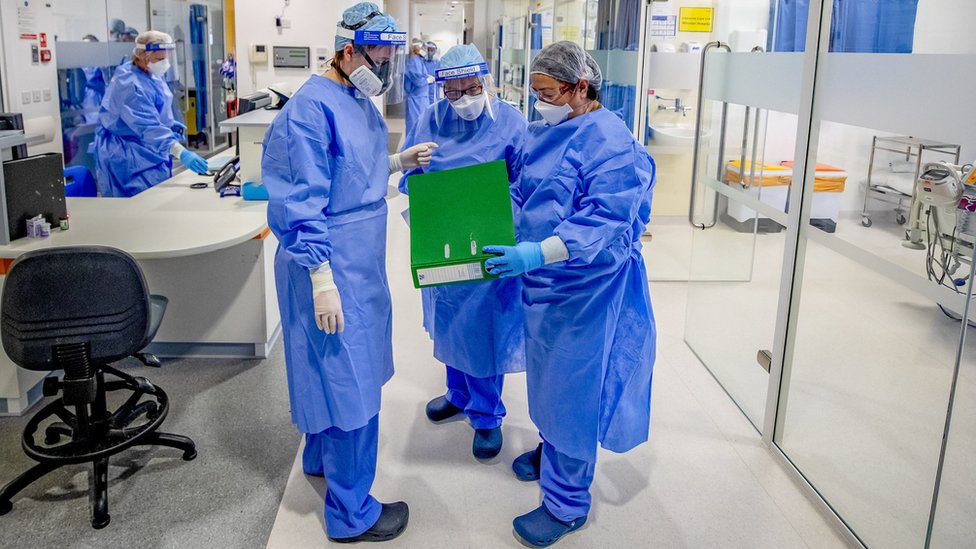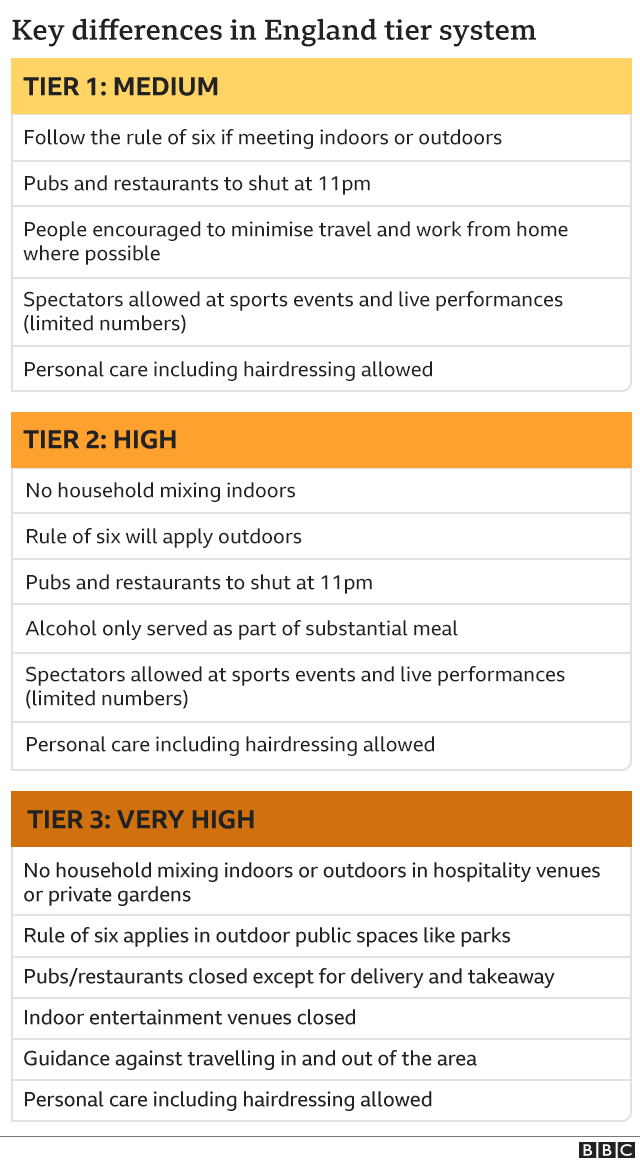Covid: Relaxing restrictions ‘could trigger third wave’, NHS bosses warn

PA Media
Relaxing Covid restrictions could trigger a third wave of the virus during the busiest time of year for hospitals, NHS bosses have warned.
In a letter to the PM, NHS Providers, which represents hospital trusts in England, urged “extreme caution” in moving any area to a lower tier.
England’s
three-tier system is due to be reviewed on 16 December.
The government said it “will not hesitate to take necessary actions to protect local communities”.
Decisions on tiers are made by ministers, based on the latest available data and advice from public health experts, a spokesperson added.
On Saturday the UK reported a further 519 deaths within 28 days of a positive Covid test and 21,502 new cases.
- Postcode check: Find out the rules where you live
- How many Covid cases are there in your area?
- ‘London must enter tier 3 now’ warn experts
Chris Hopson, chief executive of NHS Providers, told the BBC: “We’re about to hit our busiest time of year so people are really worried that if we relax the restrictions now the NHS simply won’t be able to cope with all of the work that it needs to do in late December, January and February.”
In its letter to Prime Minister Boris Johnson, NHS Providers said while there were “good signs of progress” in some parts of the country, there was a “worrying increase in infection rates across a wide range of areas”, including Essex, Kent, London and parts of Lincolnshire.
It called for areas to be moved into tier three – the highest level of restrictions – “as soon as this is needed, without any delay”.
Earlier this week, some health experts called for the capital to be placed in tier three “now” after official figures showed Outer London had a higher infection rate than some areas already in the top tier.
NHS Providers added that “the evidence of the second wave suggests that unless infection rates fall to a very low level, as they did in London after the first wave, the virus will spread again quickly as soon as restrictions on social contact are relaxed”.
“Trust leaders are worried that if infection rates remain as high as they are at the moment, relaxing the restrictions will trigger a third wave,” it said.


The letter warned of “significant pressure” on hospital beds, with 13,000 patients in hospital with Covid-19 on Thursday, compared with 500 at the beginning of September.
“Over each of the last five winters, demand for NHS beds has significantly outstripped capacity,” it said.
“Yet we are now facing the extremely concerning prospect of the NHS having 10,000 fewer beds (9%) in operation than last year, due to infection control measures, and many thousands of the remaining beds occupied by Covid-19 patients.”
It added that trust leaders were “very worried about the task they face between late December and February”, as they try to balance large numbers of Covid patients, alongside winter pressures and the new demands of the coronavirus vaccination programme.
A government spokesperson said: “We have introduced strengthened local restrictions to protect the progress gained during national restrictions, reduce pressure on the NHS and ultimately save lives.
“On top of our record NHS investment, this winter we are providing an extra £3bn to maintain independent sector and Nightingale hospital surge capacity and a further £450m to upgrade and expand A&Es.”

- THREE TIERS: How does the system work?
- SOCIAL DISTANCING: Can I give my friends a hug?
- TESTING: How do I get a virus test?
- SYMPTOMS: What are they and how to guard against them?

Although the letter stopped short of arguing for a review of the temporary relaxation of restrictions over Christmas, it urged the prime minister to “personally lead a better public debate about the risks inherent in the guidance”.
Between 23 and 27 December, three households will be able to form a “bubble”, allowing them to mix indoors and stay overnight.
Citing evidence of a rise in infection rates following Thanksgiving celebrations in the US, NHS Providers warned “a relaxation of restrictions on social contact, combined with the natural desire to come together for a traditional festival, will inevitably increase the spread of the virus”.
“We are concerned that the current public debate on these rules is ignoring the significant extra risk involved in this temporary relaxation,” it said.
“The prevailing public perception is: ‘Thank goodness we can celebrate Christmas.’ We believe it is vital for the public to understand that any extra social contact, particularly with those who are vulnerable to the effects of the virus, is risky and that they need to think very carefully before initiating such contact over the Christmas period.”
A government spokesperson said: “We know that Christmas cannot be normal this year, but we have worked closely with devolved administrations to reach agreement on a single set of UK-wide measures to help people come together with their loved ones in a way that is as safe as possible.”
Published at Sat, 12 Dec 2020 22:00:19 +0000





Comments
Loading…